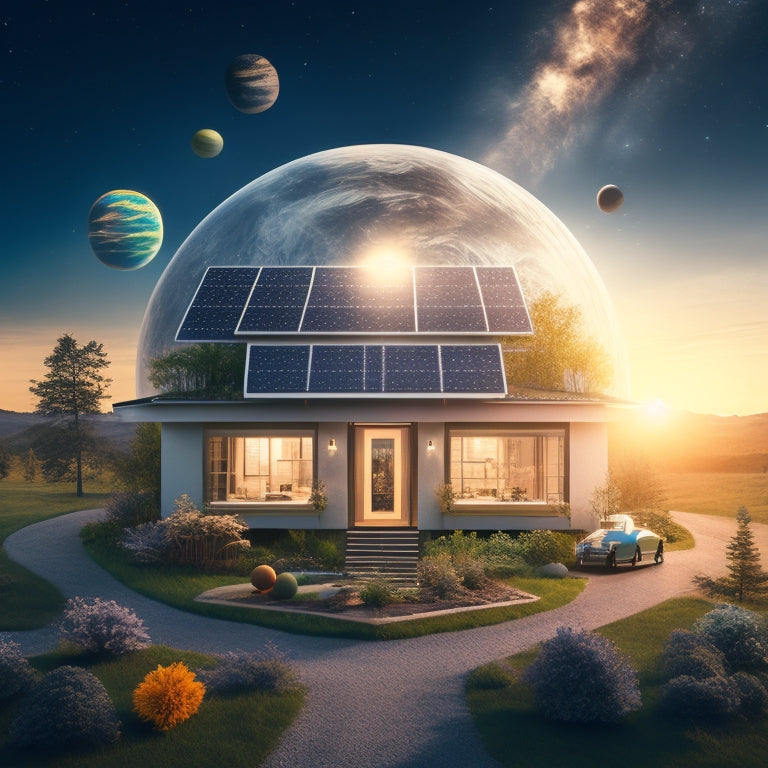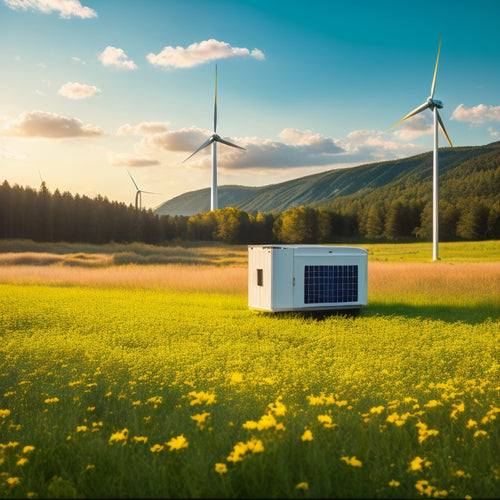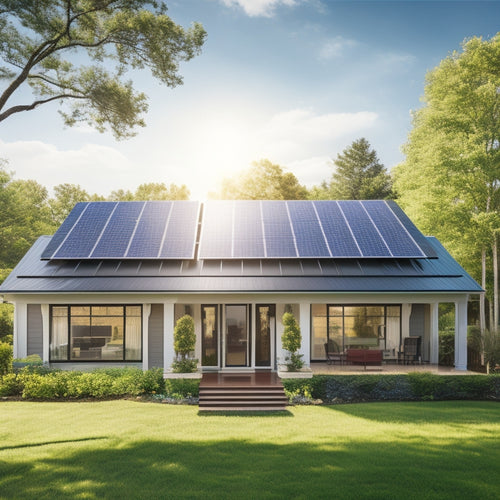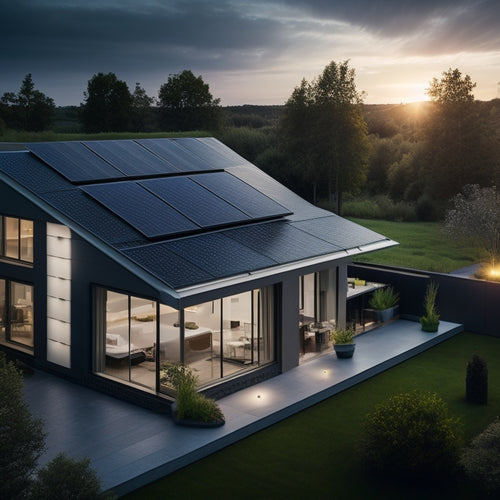
Solar System for Off Grid House
Share
You're designing a solar system for your off-grid house, which requires a customized approach to utilizing renewable energy, storing excess power, and optimizing energy usage to guarantee energy independence and zero energy costs. Primary renewable energy sources, such as solar, wind, hydro, and geothermal power, provide reliable power generation. To achieve energy autonomy, you'll need to assess your daily energy demands, selecting energy-efficient appliances and optimizing system design. By considering factors like maximum power point tracking, energy storage options, and higher efficiency solar panels, you can create a seamless off-grid solar system. Now, investigate the details of each component to bring your energy-independent dream to life.
The Essentials
- Off-grid solar panel kits offer efficient solutions for harnessing solar energy and achieving energy autonomy.
- Reliable energy storage options, including batteries with high depth of discharge and low self-discharge rates, prevent high electricity bills and power outages.
- Ideal solar panel orientation and regular system maintenance, including energy audits and performance monitoring, enhance system efficiency.
- Accurate solar system sizing requires calculating total daily energy usage in watt-hours, considering energy-intensive devices and daily usage breakdown.
- Higher efficiency solar panels with ratings above 20% maximize energy production, making them a key consideration for off-grid house solar systems.
Renewable Energy for Homes
You're likely evaluating renewable energy sources, such as solar, wind, hydro, and geothermal power, to fuel your off-grid home. Each of these options has its advantages and disadvantages, which you'll need to weigh when deciding which one is right for you.
When designing an off-grid solar power system, it's crucial to assess the complexity and uncertainty of the system's design and installation, as well as the high upfront costs associated with purchasing equipment and batteries grid independent power.
To guarantee a steady supply of energy, you'll also need to investigate energy storage options, like batteries and fuel cells, that can store excess energy for later use.
Renewable Energy Sources
With the need to reduce reliance on fossil fuels and mitigate climate change, renewable energy sources have become an indispensable component of off-grid homes. You're likely considering which options are best for your off-grid house.
Wind energy, hydro power, and geothermal heating are popular choices, offering reliable and consistent power generation. Biomass energy, derived from organic matter, is another viable option.
Solar thermal systems, which capture heat from the sun, can provide hot water and space heating. Additionally, off-grid solar panel kits have become an attractive solution, providing a thorough and efficient way to capture the power of the sun off-grid solar power.
To maximize the benefits of renewable energy, it's vital to prioritize energy conservation and sustainable practices in your daily life. This includes reducing your carbon footprint by using energy-efficient appliances and implementing passive design principles in your home.
You may also be eligible for renewable incentives, such as tax credits or rebates, to offset the initial investment costs. Additionally, net metering policies allow you to sell excess energy back to the grid, providing a potential revenue stream.
Energy Storage Options
As you examine renewable energy sources for your off-grid home, it's vital to reflect on energy storage options that can efficiently capture and store excess energy generated by your system. This is where battery technologies come into play, offering various storage solutions to suit your energy needs.
You'll need to take into account inverter types, charge controllers, and system integration to guarantee seamless energy management. Furthermore, it's important to have a reliable storage solution to avoid frustrating issues such as high electricity bills due to unpredictable grid rates and unexpected power outages Renewable Energy.
When selecting renewable batteries, think about their lifespan, typically ranging from 5 to 15 years, depending on the technology and usage. Installation costs and maintenance requirements will also impact your decision.
Look for batteries with high depth of discharge (DOD) and low self-discharge rates for peak performance. Additionally, consider the type of battery chemistry, such as lead-acid, lithium-ion, or nickel-cadmium, each with its pros and cons.
Zero Energy Bills Guaranteed
With a solar system designed for your off-grid house, you'll enjoy zero energy costs, as the system generates all the power you need.
By utilizing off grid solar panel kits and renewable energy solutions, you'll be able to capture the sun's energy efficiently and reduce your carbon footprint.
This means you'll never receive an electricity bill again, giving you complete energy independence.
Zero Energy Costs
By integrating a solar system into your off-grid house, you can eliminate reliance on public utilities and enjoy zero energy costs, guaranteed. This means no more worrying about rising electricity rates or unpredictable energy bills. With a solar system, you'll be generating your own clean energy and reducing your carbon footprint.
To maximize energy efficiency, it's crucial to conduct an energy audit of your off-grid house. This will help identify areas of energy loss and provide opportunities for improvement. Additionally, take advantage of solar incentives offered by the government to offset the initial cost of your solar system.
Here is a breakdown of the benefits of a solar system for your off-grid house:
| Benefits | Description |
|---|---|
| Zero Energy Costs | No more electricity bills or rate hikes |
| Energy Efficiency | Identify and reduce energy loss in your home |
| Solar Incentives | Government incentives to offset system costs |
| Carbon Reduction | Generate clean energy and reduce your carbon footprint |
| Energy Independence | Break free from public utilities and enjoy energy freedom |
Energy Independence Now
In pursuit of ultimate energy freedom, you're taking a crucial step towards breaking free from the shackles of public utilities with a solar system for your off-grid house.
By utilizing the power of the sun, you'll be generating your own clean energy, reducing your reliance on the grid, and slashing your energy bills to zero. This is the epitome of energy autonomy, where you're in control of your energy needs, not the utility companies.
With a solar system, you'll be living the dream of sustainable living.
Imagine waking up every morning, knowing that your energy needs are being met without harming the environment. The sense of freedom and independence you'll feel is priceless.
No more worrying about rising energy costs or the uncertainty of public utilities. You'll be your own energy provider, generating power on your own terms.
Maximum Power Point Tracking
You're about to utilize the full potential of your solar system with Maximum Power Point Tracking (MPPT).
This technology optimizes energy harvest by identifying the maximum power point of your solar panels and adjusting the system's operation to extract the most energy possible.
With residential solar power systems, MPPT is essential for maximizing energy independence.
Optimizing Energy Harvest
Most solar panels operate at their maximum potential only under ideal conditions, which rarely occur in real-world scenarios. As someone living off the grid, you need to enhance your energy harvest to guarantee a consistent power supply. This is where Maximum Power Point Tracking (MPPT) comes in.
MPPT is a technique that allows your solar panel system to operate at its maximum power output, even under varying environmental conditions. By continuously monitoring the voltage and current output of your solar panels, the MPPT system adjusts the impedance to ascertain maximum energy harvest.
Here's how MPPT optimization works:
| Parameter | Impact on Energy Harvest |
|---|---|
| Temperature | High temperatures reduce energy output, while low temperatures increase it |
| Solar Panel Positioning | Ideal positioning guarantees maximum energy output, while suboptimal positioning reduces it |
| Energy Consumption Patterns | Matching energy production to consumption patterns minimizes energy waste |
Enhancing System Efficiency
By optimizing energy harvest through MPPT, your off-grid solar panel system can achieve unparalleled efficiency. Maximum Power Point Tracking (MPPT) guarantees your system operates at its peak, even under varying weather conditions.
To further enhance efficiency, consider ideal solar panel orientation, taking into consideration seasonal changes and potential shading issues. Inverter selection is also vital, as it directly impacts system performance.
Conduct a thorough shading analysis to identify and mitigate any potential energy losses. Regular system maintenance, including energy audits and performance monitoring, helps identify areas for improvement.
Load management strategies, such as load shedding and shifting, can also enhance energy usage. Installation positioning, weather impact, and grid compatibility must also be contemplated to guarantee seamless integration with your off-grid setup.
Assess Your Energy Demands
You need to determine your daily energy usage to size your solar system correctly. Start by calculating the total watt-hours you use each day, considering the power ratings of all your appliances, including lights, refrigerators, and computers.
This will help you identify your energy-intensive devices and prioritize their inclusion in your off-grid system. As you calculate your energy demands, consider investing in a home battery system to guarantee a reliable backup power source during outages.
Additionally, investigate renewable energy storage options to optimize your system's performance.
Daily Energy Usage
Evaluating your daily energy demands is an essential step in designing a solar system for your off-grid house. You need to understand how much energy you use daily to determine the size of the solar array, battery bank, and other system components.
To assess your energy demands, you'll need to monitor your energy consumption over a period of time. This can be done using energy monitoring devices or by analyzing your past utility bills.
Here's a sample breakdown of daily energy usage:
| Load Type | Daily Energy Usage (Wh) | Number of Hours Used |
|---|---|---|
| Refrigeration | 1200 | 8 |
| Lighting | 600 | 12 |
| Computing | 300 | 4 |
| Water Pumping | 900 | 2 |
Appliances' Power Ratings
Appliances' power ratings play an essential role in evaluating your energy demands. You'll need to assess the power consumption of each appliance to determine your overall energy requirements. This involves checking the nameplate ratings or the manufacturer's specifications for each device. Typically, these ratings are listed in watts (W) or amps (A) at a specific voltage (V).
When selecting appliances for your off-grid house, look for energy-efficient models with low power ratings. This will help reduce your energy demands and allow you to conserve energy. For instance, a 2W LED light bulb consumes considerably less power than a 60W incandescent bulb. Similarly, a 1.5A refrigerator is more energy-efficient than a 3A model.
Accurate appliance selection is vital for energy conservation. By choosing appliances with low power ratings, you'll reduce your reliance on the solar system, minimize energy waste, and enjoy a more sustainable off-grid lifestyle.
Be certain to factor in the total power consumption of all your appliances when designing your solar system to guarantee it meets your energy demands.
Higher Efficiency Solar Panels
You'll want to contemplate higher efficiency solar panels to maximize your off-grid house's energy production.
Panel efficiency ratings, measured as a percentage, indicate how effectively a panel converts sunlight into electricity.
Look for high-efficiency panels with ratings above 20% to get the most energy from your solar system.
Panel Efficiency Ratings
The quest for higher efficiency solar panels begins with understanding panel efficiency ratings, which measure a panel's ability to convert sunlight into electrical energy.
You'll want to know how efficiently your solar panels can utilize the sun's power to generate electricity for your off-grid house. Panel efficiency ratings are usually expressed as a percentage, with higher ratings indicating more efficient energy conversion. For instance, a panel with a 20% efficiency rating can convert 20% of the sun's energy into electricity, while a panel with a 15% rating can only convert 15%.
When comparing solar panel technology, efficiency comparison is vital.
You'll want to evaluate the efficiency ratings of different panels to determine which ones will provide the most energy for your off-grid house. Look for panels with high efficiency ratings, as they'll generate more power per unit area.
Keep in mind that higher efficiency panels often come with a higher price tag, so it's important to weigh the costs and benefits before making a decision.
Frequently Asked Questions
Can I Add Solar Panels to an Existing Off-Grid System?
You can definitely add solar panels to your existing off-grid system, expanding your energy independence. Assess your current setup's compatibility, then plan a seamless solar panel installation to enhance your off-grid expansion, increasing your power generation and freedom.
Are Solar Panels Durable Enough for Harsh Weather Conditions?
You're wondering if solar panels can withstand harsh weather conditions. Think of them like a trusty shield, deflecting extreme winds and rain like a 2011 Japanese solar farm that survived a tsunami, boasting a 25-year lifespan and extreme weather resilience.
Do I Need a Backup Generator for Off-Grid Solar Systems?
You'll likely need a backup generator if you don't have sufficient battery storage to cover extended periods of low sunlight or high energy usage, emphasizing the importance of regular system maintenance to guarantee peak performance.
Can I Use Solar Power for Heating and Cooling Systems?
You're worried solar power can't handle heating and cooling? Think again! You're capable of utilizing solar energy for efficient cooling and heating through advanced solar heating systems, ensuring maximum cooling efficiency and freedom from utility bills.
Are Off-Grid Solar Systems Compatible With Electric Vehicles?
You're wondering if your off-grid lifestyle can accommodate an electric vehicle; yes, you can make it work with a compatible solar system, investing in charging infrastructure and smart energy management to optimize your power usage and freedom.
Final Thoughts
You've taken the first step towards embracing renewable energy for your off-grid home. With a solar system designed specifically for your energy demands, you can bid farewell to zero energy bills. Take, for example, the Johnsons' off-grid cabin in Colorado, which now runs entirely on solar power. Their 5 kW system, equipped with maximum power point tracking and high-efficiency panels, generates 6,500 kWh annually, covering their entire energy needs.
Related Posts
-

Sustainable and Eco-Friendly Generators for a Reduced Carbon Footprint
Sustainable and eco-friendly generators are perfect for cutting your carbon footprint and increasing energy efficienc...
-

Home Solar Installation Cost
You're considering installing solar panels on your home, and the upfront cost is likely the biggest hurdle standing i...
-

Home Solar Battery
You're opting for a home solar battery that allows you to utilize the power of the sun during the day and use it at n...


